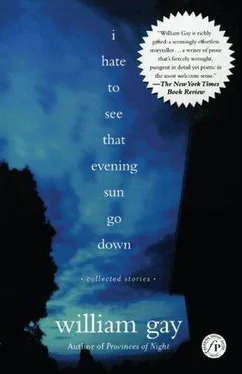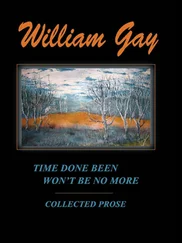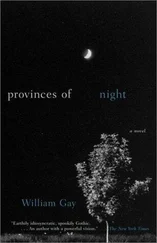He leaned the rifle carefully against a wall, set the paper bag of food by the fireplace hearth, and looked about for something to burn. He broke up rotting floorboards from the porch and stacked the fireplace with them and with the bag for tinder set them alight. He could hear a heavy swift beating of wings up the flue and a rain of soot fell. After a while the area immediately before the hearth warmed but the wind came looping across the windowsill and he wrapped the blanket about his shoulders and sat crouched before the fire with his hands extended like a supplicant.
When he was warm he opened a can of the beans and a tin of the sausages and set them near the coals to heat. He ate crackers while they warmed and when they did he ate with his pocketknife, chewing slowly and staring abstractedly into the fire.
He was warm and dry and almost content. He figured at least he wasn’t in jail. Nobody was telling him about burning their mother’s body or crying out in their sleep and if the notion struck him to just walk out the door into the night there were no bars. All around him was the Harrikin, miles of uninhabited woods smothered in rain and darkness and he drew a small bitter comfort from it.
After a while he dozed crouched before the fire but awoke cold and disoriented and for a moment he couldn’t fathom where he’d got to. The dead wood had burned away to the faintest glow in the depths of a feathery caul of ash. It was still raining and the wind was still blowing in a cold mist through the broken windows so that the blanket felt damp across his shoulders. He got up and went through the house striking matches looking for something to burn. Beneath a collapsed shelf he found a motley of books and he stacked an armload and carried them back to the fireplace. He ripped out pages and piled them on the quaking ash until they flared up and then he laid on the volumes. Finally they caught and he sat before them watching little blue flames flicker over the leather bindings.
He noticed with some amusement that they comprised a set of State of Tennessee law books and it occurred to him how all-encompassing the law was: he and Doneita had both appealed to it each in their own way and both had drawn a modicum of comfort from it each according to their natures.
WITH THE BLANKET mantled about him and the rifle slung under it he watched from beneath the wet ruin of his hat four police cruisers creep up the road far below him. From his aerie the red chert road wound like a capillary of road on a map. The road widened where fifty years before the post office and commissary had stood and here the cruisers pulled over side by side and stopped. Across the folds of rain-blurred horizons the cars looked tiny and insignificant. Men got out of the cars into the rain and stood in a loose group. He wished he’d had the foresight to bring binoculars. He’d have liked to know was Harris along.
In truth he was a little surprised. He’d have thought they’d have waited for better weather but he guessed burning a squad car raised the ante considerably and he was truly a wanted man.
He was not alarmed. The men moved into the sodden woods with a reluctance that was almost visible to the naked eye. The deputies he had seen around the jail looked soft and out of shape. They looked as if they drank too much beer, smoked too many cigarettes, ate too many doughnuts. Beasley did not drink and had not smoked a cigarette for twenty-five years and he could take a doughnut or leave it alone and scrambling up the bluff toward deeper timber he was not even breathing hard.
As the day progressed the weather did not warm as he’d expected nor did the rain abate and if there was sun at all behind the leaden weeping sky he saw no sign of it. By noon he was far back in the Harrikin, following the spine of a ridge that kept breaking off into deep blue hollows. He could hear the rain in the trees and by midafternoon it had begun to be mixed with sleet and it was freezing on the leaves and branches and the leaves he brushed had the tinny half-musical, sound of a carillon.
He passed by an ancient graveyard, the tilting slabs leached thin and fragile, transient as whatever souls they’d marked. Sheltered beneath a cedar he ate the last of the Viennas and crackers and listened to the sleet rattle in the leaves. Graveyard cleanin, dinner on the ground, he thought sardonically.
The day wore on gray and cold and darkened so incrementally you couldn’t have told the exact moment night fell but after a while he was walking in darkness.
He knew he had to stop. Only a fool would continue on here. He knew this country as well as anyone but there were core-sample holes deep as wells, their bottoms drifted with leaves covering the bones of luckless animals or perhaps worse that stumbled into them. And if he became lost he would in all probability wander for miles in the wrong direction.
By the time he had a fire going he was half frozen. He finally found tinder beneath a rotten husk of log and when he had it going he piled on whatever he could find, branches and fallen saplings and finally the log itself was burning and he had an enormous bonfire going he figured you could see for miles. Snow had begun falling with the sleet and huge flakes drifted into the toiling smoky glare and vanished. The wet earth began to steam and standing before the fire with the blanket cowled about him Beasley looked like some cautionary symbol set up to warn of such depths of misery as the human race can sink to.
Beasley thought of his other life but already it was lost to him. It had been a mere prelude to this. He seemed to have been born the moment he shot Sugarbaby through the screen. He stood back to the fire with the rifle at port arms scanning the darkness. There was nothing beyond the limits of the fire, where the light tended away the world simply ceased to exist. Come on you sons of bitches, Beasley called. If you’re out there come up and warm.
For the first time in his life he realized that sometimes in life you go through doors that only open one way. You can stand before them and think about whether you want to go through them or not. But when you do and the door closes behind you there is no way to go back. The door is featureless and unknobbed and smooth as a sheet of glass. You can pound on it and claw till your fingers are bleeding, scream until your throat is raw, but no one will open the door, no one will even hear you.
HE WAS LOST and he had been lost for some time, the drifting snow obscuring landmarks and giving the landscape a curious sameness, the snow already ankle-deep and falling so fast and hard he could scarcely see where he was going.
He was following a sound, a hollow clang of metal on metal that he seemed to have heard subliminally for hours, maybe longer, maybe since the moment something had wound too tight inside him and finally broken and he’d blown Sugarbaby off the porch. The sound seemed all there was left in the world, all there was of reality beyond the curtain of shifting white. It was a random and infrequent noise, and sometimes he’d have to stand still in the hushed woods waiting for it to come again so that he could get a fix on it, waiting and hearing nothing but the sound of his breathing and the soft hiss of the woods filling up with snow. Then finally the clang would come again and he would go on.
At length he stood beneath the source of the sound. Four legs of structural steel rose high into the air. A tiny house set atop them, what he judged was sixty or seventy feet up. He didn’t know what it was. An abandoned fire lookout station perhaps, or maybe something that had been built by the mining company so long ago its very purpose was lost.
He hunkered for a moment against the trunk of a tree and stared upward at the house. A steel ladder began a few feet off the ground and ascended to heights that made his head swim. The metal sign that said CLIMB AT YOUR OWN RISK was rusted and pocked by ancient rifle fire. As he watched a steel door slammed against the wall, the wind whipped the sound away. The higher he’d climbed the thinner the timber had gotten and here the wind came whipping down out of the north and howled through the steel tower like a banshee’s warning.
Читать дальше












